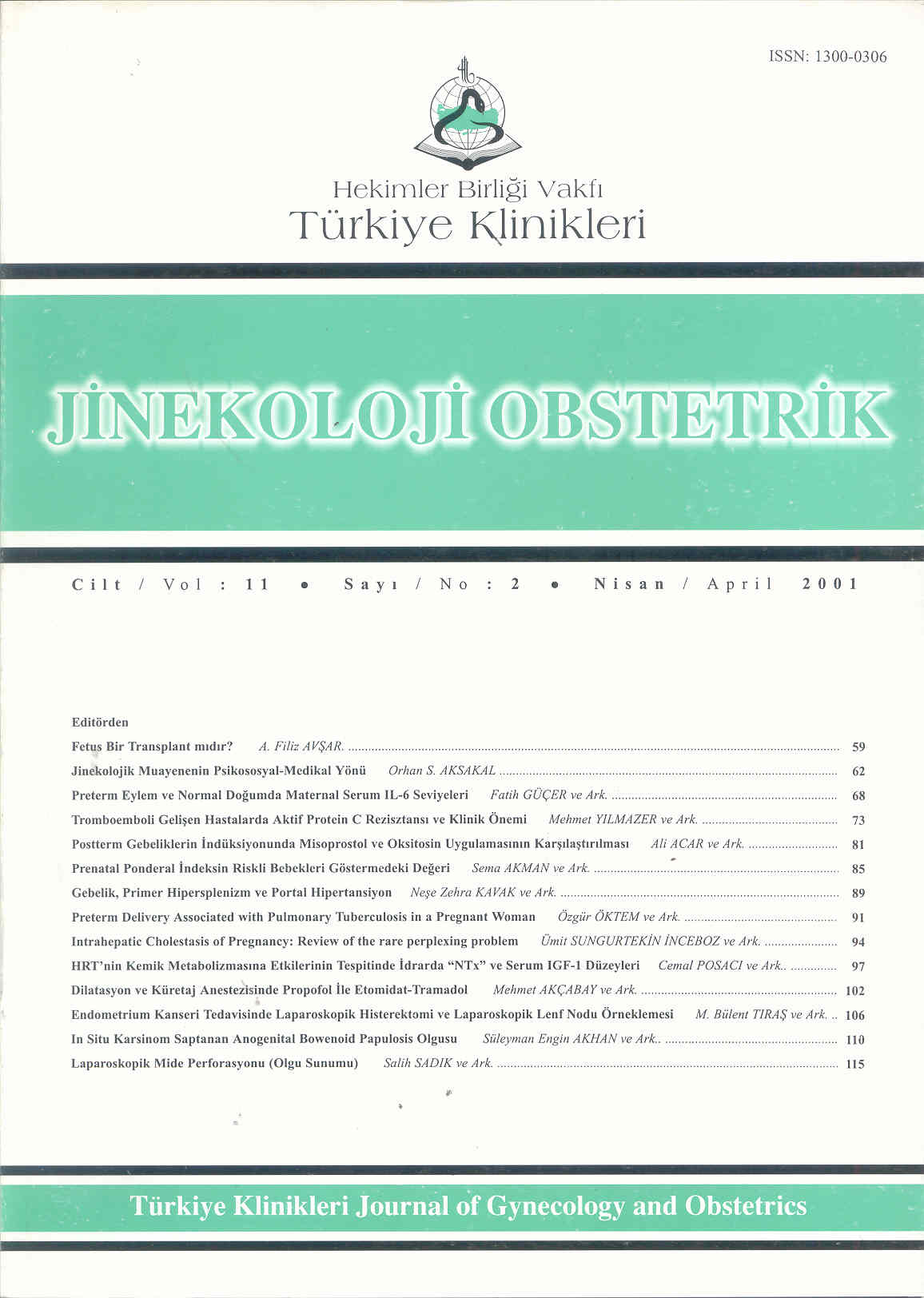Open Access
Peer Reviewed
ARTICLES
3582 Viewed1768 Downloaded
Activated Protein C Resistance And Clinical Significance In Patients Diagnosed Thromboembolic Attack During Pregnancy And Puerperium
Gebelik ve Puerperium Döneminde Tromboemboli Gelişen Hastalarda Aktif Protein C Rezistansı ve Klinik Önemi
Turkiye Klinikleri J Gynecol Obst. 2001;11(2):73-80
Article Language: TR
Copyright Ⓒ 2025 by Türkiye Klinikleri. This is an open access article under the CC BY-NC-ND license (http://creativecommons.org/licenses/by-nc-nd/4.0/)
ÖZET
Amaç: Bu çalışmanın amacı gebelik ve puerperal dönemdeki tromboembolizm ile aktif protein C rezistansı arasındaki ilişkiyi araştırmaktır. Çalışma Planı: Gebelik ve puerperal dönemde tromboembolik komplikasyonu olan 35 kadında aktif protein C rezistansı analiz edilmiştir. Aktif protein C rezistansı test sonuçları aktif protein C oranları olarak ifade edilmiş, 1in altındaki değerler aktif protein C rezistansı olarak alınmıştır. Sonuçlar: Gebelik ve puerperal dönemde tromboembolik komplikasyonu olan kadınlardan 11(%31.42)sinde aktif protein C rezistansı saptanmıştır Tartışma: Gebelik ve puerperal dönemde tromboembolik komplikasyon öyküsü olan kadınlarda aktif protein C rezistansı oranı oldukça yüksek olarak bulunmuştur ancak bizim bulgularımızı destekleyecek ileri çalışmalara ihtiyaç vardır.
Amaç: Bu çalışmanın amacı gebelik ve puerperal dönemdeki tromboembolizm ile aktif protein C rezistansı arasındaki ilişkiyi araştırmaktır. Çalışma Planı: Gebelik ve puerperal dönemde tromboembolik komplikasyonu olan 35 kadında aktif protein C rezistansı analiz edilmiştir. Aktif protein C rezistansı test sonuçları aktif protein C oranları olarak ifade edilmiş, 1in altındaki değerler aktif protein C rezistansı olarak alınmıştır. Sonuçlar: Gebelik ve puerperal dönemde tromboembolik komplikasyonu olan kadınlardan 11(%31.42)sinde aktif protein C rezistansı saptanmıştır Tartışma: Gebelik ve puerperal dönemde tromboembolik komplikasyon öyküsü olan kadınlarda aktif protein C rezistansı oranı oldukça yüksek olarak bulunmuştur ancak bizim bulgularımızı destekleyecek ileri çalışmalara ihtiyaç vardır.
ANAHTAR KELİMELER: Aktif protein C rezistansı, tromboembolizm, gebelik, puerperium
ABSTRACT
Objective: The objective of this study is to evaluate the association between venous thromboembolism during pregnancy and puerperium and activated protein C resistance. Study Desing: Activated protein C resistance was analyzed in 35 women with thromboembolic complications during pregnancy and puerperium. Results of the activated protein C resistance test were expressed as activated protein C ratios, values <1 indicating activated protein C resistance. Results: Activated protein C resistance was found in 11(%31.42) of women with thromboembolic complications during pregnancy and puerperium. Conclusion: Activated protein C resistance was found to be highly prevalent in women with history of thromboembolic complications during pregnancy and puerperium but further studies are necessary to confirm our findings.
Objective: The objective of this study is to evaluate the association between venous thromboembolism during pregnancy and puerperium and activated protein C resistance. Study Desing: Activated protein C resistance was analyzed in 35 women with thromboembolic complications during pregnancy and puerperium. Results of the activated protein C resistance test were expressed as activated protein C ratios, values <1 indicating activated protein C resistance. Results: Activated protein C resistance was found in 11(%31.42) of women with thromboembolic complications during pregnancy and puerperium. Conclusion: Activated protein C resistance was found to be highly prevalent in women with history of thromboembolic complications during pregnancy and puerperium but further studies are necessary to confirm our findings.
MENU
POPULAR ARTICLES
MOST DOWNLOADED ARTICLES





This journal is licensed under a Creative Commons Attribution-NonCommercial-NoDerivatives 4.0 International License.










